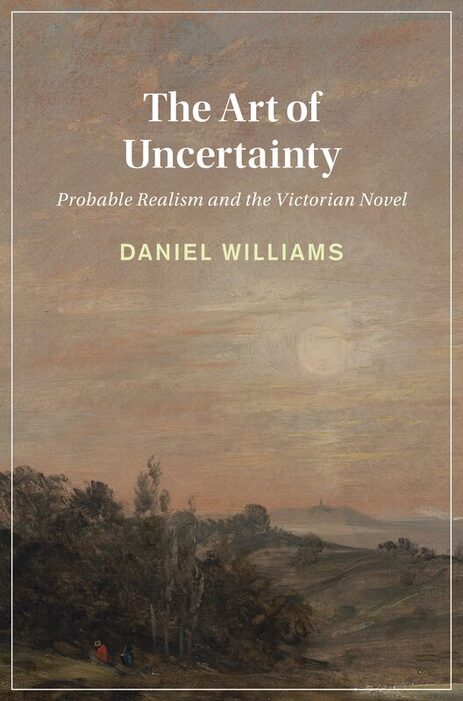RESEARCH
My work addresses British literature of the long 19th century in relation to science, philosophy, and intellectual history. I also work on the literature of South and Southern Africa.
My first book, The Art of Uncertainty: Probable Realism and the Victorian Novel, is forthcoming with Cambridge University Press in 2024 (Studies in Nineteenth-Century Literature and Culture).
I'm also working on a second book about the relationship between weather/climate and social form in 19th-century Britain and its empire, which examines literary, scientific, and social theory materials.
With Jeffrey Blevins, I edited a special issue of Poetics Today (2020) on “Logic and Literary Form.”
With Jacob Risinger, I am editing a special issue of Literature Compass on “Collecting, Collectors, and Collections in the Nineteenth Century.”
Among other topics, I have written articles on rumor in the novel; on cloud studies, meteorology, and theories of political liberty; on the poetry and poetics of evolutionary theory and its opponents; on the relationship between Victorian logic and theories of genre; on the law of accident; on deception and the mid-20th-century English Bildungsroman; and on animal ethics and ecological themes in South African literature.
My first book, The Art of Uncertainty: Probable Realism and the Victorian Novel, is forthcoming with Cambridge University Press in 2024 (Studies in Nineteenth-Century Literature and Culture).
I'm also working on a second book about the relationship between weather/climate and social form in 19th-century Britain and its empire, which examines literary, scientific, and social theory materials.
With Jeffrey Blevins, I edited a special issue of Poetics Today (2020) on “Logic and Literary Form.”
With Jacob Risinger, I am editing a special issue of Literature Compass on “Collecting, Collectors, and Collections in the Nineteenth Century.”
Among other topics, I have written articles on rumor in the novel; on cloud studies, meteorology, and theories of political liberty; on the poetry and poetics of evolutionary theory and its opponents; on the relationship between Victorian logic and theories of genre; on the law of accident; on deception and the mid-20th-century English Bildungsroman; and on animal ethics and ecological themes in South African literature.

The Art of Uncertainty: Probable Realism and the Victorian Novel.
The Art of Uncertainty studies how the Victorian novel represented modes of thinking, judging, and acting in the face of partial knowledge and unclear outcome. It shows how George Eliot, Wilkie Collins, William Thackeray, Thomas Hardy, and later Joseph Conrad drew on science, mathematics, philosophy, and the law to articulate a phenomenology of uncertainty against emergent models of prediction and decision-making. In imaginative explorations of unsure reasoning, hesitant judgment, and provisional action, these novelists cultivated distinctive responses to uncertainty as intellectual concern and cultural disposition, participating in the knowledge work of an era profoundly shaped by numbers and numerical approaches to the future.
Reading for uncertainty yields a rich account of the dynamics of thinking and acting in the nineteenth-century novel, a fresh understanding of realism as a genre of the probable, and a vision of literary-critical judgment as provisional and open-ended. The book spotlights the value of literary art and its modes of knowledge in a present marked by models and technologies of prediction.
The Art of Uncertainty studies how the Victorian novel represented modes of thinking, judging, and acting in the face of partial knowledge and unclear outcome. It shows how George Eliot, Wilkie Collins, William Thackeray, Thomas Hardy, and later Joseph Conrad drew on science, mathematics, philosophy, and the law to articulate a phenomenology of uncertainty against emergent models of prediction and decision-making. In imaginative explorations of unsure reasoning, hesitant judgment, and provisional action, these novelists cultivated distinctive responses to uncertainty as intellectual concern and cultural disposition, participating in the knowledge work of an era profoundly shaped by numbers and numerical approaches to the future.
Reading for uncertainty yields a rich account of the dynamics of thinking and acting in the nineteenth-century novel, a fresh understanding of realism as a genre of the probable, and a vision of literary-critical judgment as provisional and open-ended. The book spotlights the value of literary art and its modes of knowledge in a present marked by models and technologies of prediction.